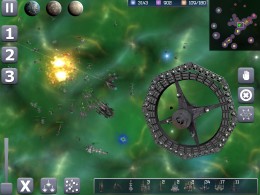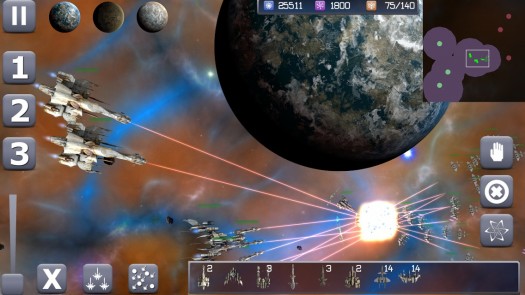 With its large screen and multi-touch controls, real-time strategy titles have had somewhat of a resurgence on iPads (and its smaller iOS brethren, to a lesser extent). Bitmen Studio’s Galactic Conflict RTS ($5.99) is the latest such title, with a focus on tons of spaceships on-screen and the requisite massive scale of dogfights. While Galactic Conflict certainly succeeds in that regard, the rest of the game is relatively benign, leading to an otherwise standard real-time strategy game.
With its large screen and multi-touch controls, real-time strategy titles have had somewhat of a resurgence on iPads (and its smaller iOS brethren, to a lesser extent). Bitmen Studio’s Galactic Conflict RTS ($5.99) is the latest such title, with a focus on tons of spaceships on-screen and the requisite massive scale of dogfights. While Galactic Conflict certainly succeeds in that regard, the rest of the game is relatively benign, leading to an otherwise standard real-time strategy game.
Following the last remnants of Earth across space, Galactic Conflict’s campaign features a dozen missions that put you in control of the Terran Confederation as they strive to defend themselves from attacks by the Pyros race. Narratively, what little story that exists in the campaign is told through standard in-mission cutscenes. While I found the campaign a good way to get introduced to all the ships and upgrades, from a story standpoint it was relatively bland. Thankfully, a skirmish mode and decent multiplayer offering exist for folks that just want to get into the battle.
Regardless of which mode you play, battles in Galactic Conflict always start out slow and eventually build up to a fast and furious dogfight between ships of various sizes and strengths. However, the inevitable conflict, a lot of emphasis is placed on infrastructure. All maps start with the player in control of a planet which can have various buildings built upon it. Resource management is accomplished via building ore and crystal mines, ships are built after erecting their respective factories and building a research lab opens up the ability to research improvements and new ships.
Actual battles, meanwhile, are relatively standard for an RTS with some quirks. For starters, units emulate the dogfighting behavior of flight combat meaning that units make attack passes and circle around for secondary attack passes. While this looks pretty cool, it makes attacking units pretty hard to wrangle into any kind of formation. In addition, it’s pretty hard to tell the difference between units at the farthest zoom settings, making it difficult to tell where certain ships should be attacking.
 While Galactic Conflict’s potential magnitude is a plus from a technical standpoint (and certainly looks cool), the sheer amount of ships at your control in later levels removes a lot of the strategy associated with the game. Sure, each faction eventually builds up to a total of 13 ships and said ships have a variety of strengths and weaknesses against each other, but I found myself focusing less on strategy and more of ‘zerg-rushing’ the opposition. Considering later missions place an emphasis on quick reflexes and decisions, it’s more conducive to simply get as many ships out on the field (with some variety, of course) as possible.
While Galactic Conflict’s potential magnitude is a plus from a technical standpoint (and certainly looks cool), the sheer amount of ships at your control in later levels removes a lot of the strategy associated with the game. Sure, each faction eventually builds up to a total of 13 ships and said ships have a variety of strengths and weaknesses against each other, but I found myself focusing less on strategy and more of ‘zerg-rushing’ the opposition. Considering later missions place an emphasis on quick reflexes and decisions, it’s more conducive to simply get as many ships out on the field (with some variety, of course) as possible.
Control-wise, Galactic Conflict handles somewhat decently. There are options to assign ships to various groups, various methods of selecting units on screen, and a quick way to switch between planets (and thus unit factories). In addition, moving units are accomplished through a variety of taps and hold-taps (along with secondary buttons just in case). While Galactic Conflict’s controls made for some easy time mass-moving units across, the same couldn’t be said for micromanaging individual units. Some of this is due to sheer scope (battles can have dozens and dozens of ships going simultaneously) while the rest is due to some due to some inconsistency with the touch controls.
In addition to the control issues above, I also encountered some annoying bugs, such as an instance where I completed all the objectives in a story mission but the game refused to dump me out of the completed level and on to the next piece of the campaign. Of course, the inability to save during campaign levels also adds to the nuisance.
This all leads to an RTS that, while enjoyable, doesn’t quite hit all the marks to reach the upper echelon of iOS RTS titles. The story is a little too boring, units a little too hard to discern (and control) and the nagging issues a little too annoying. Still, the foundational gameplay in Galactic Conflict is sound and is certainly worth checking out for iOS RTS fans as long as you don’t go into it expecting the next great masterpiece.

